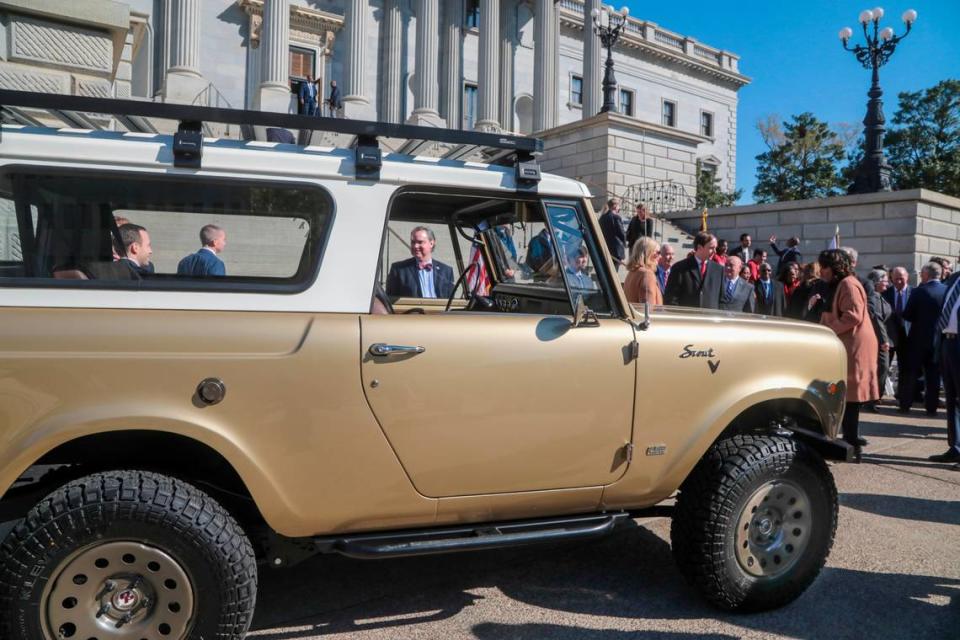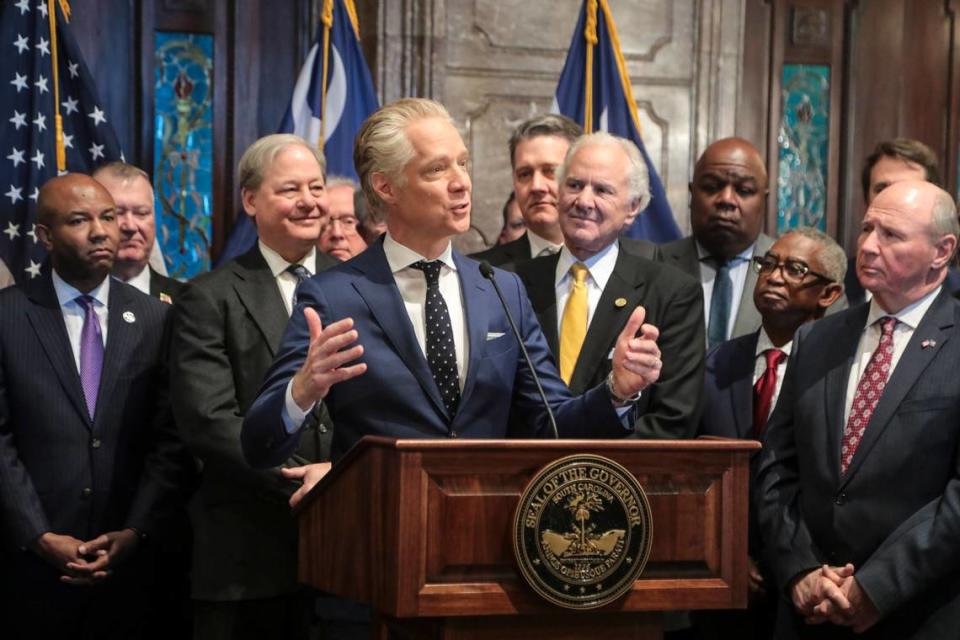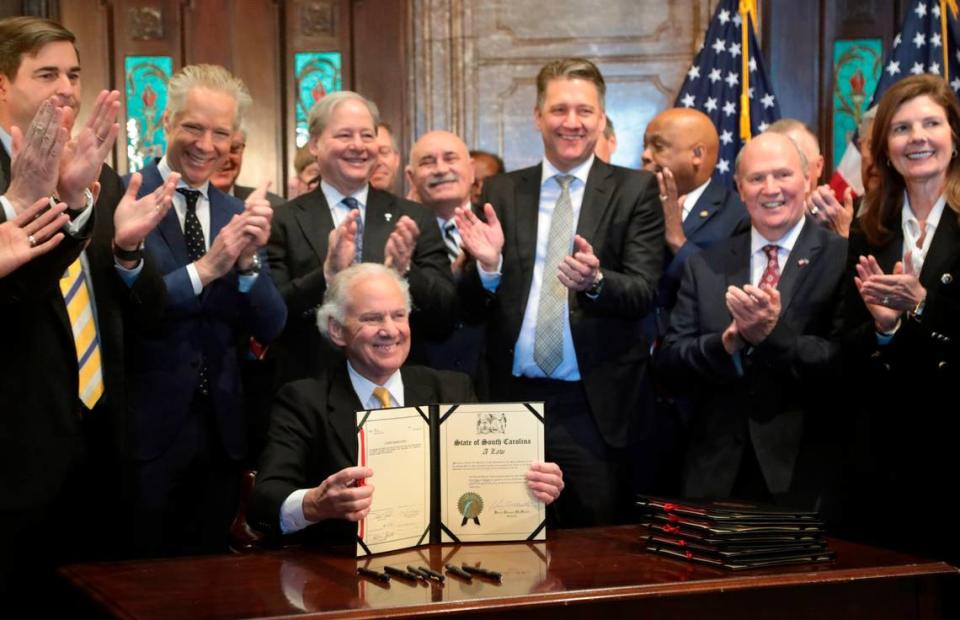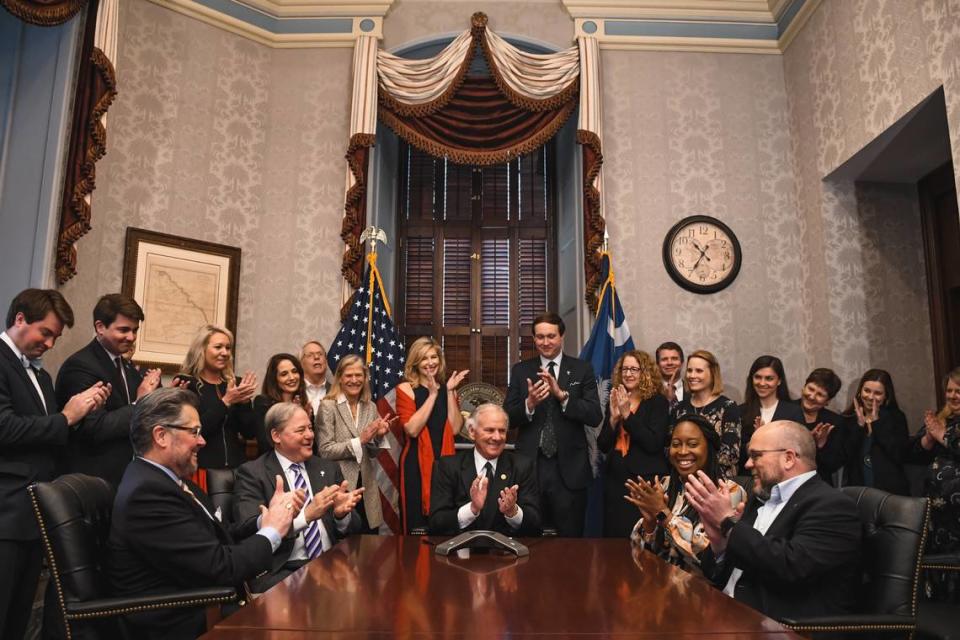How Scout was won: Behind the scenes of SC’s rapid quest to land a $2B business deal
A Volkswagen board member pulled an old plastic card from his wallet and handed it to S.C. Gov. Henry McMaster.
A South Carolina driver’s license, issued to Peter Bosch, that had expired more than 20 years ago.
Now Bosch stood beside the governor holding that license, surrounded by a who’s who of capital city power brokers and American and German auto executives at an exclusive dinner inside Columbia’s Williams-Brice football stadium. Bosch explained how as a college student he had interned at BMW in Upstate South Carolina in the 1990s, growing so enamored of the state that he never discarded that license.
On this Sunday night in February, South Carolina was on the verge of sealing one of its biggest economic deals since BMW itself in 1992, as Volkswagen’s Scout Motors teetered on committing to a $2 billion electric vehicle manufacturing plant in Blythewood, just outside the state capital.
Few local or state leaders knew Volkswagen’s Scout was courting the Midlands until just before the carmaker said “I do” to South Carolina. The matchmakers — mostly county and state economic development officials, along with McMaster and a select few others — worked feverishly to tie the very big knot in a matter of weeks, taking a gamble on hefty promises before most in South Carolina even knew what promises were being made, or to whom.
The inside story on how the deal came to be reveals a fast-paced process that hinged on engineering, money, politics and personalities. A full-on recruiting-style dinner and “Sandstorm” light show at Williams-Brice Stadium played a part. Negotiations were done while the sour taste of a recent bad deal with Carolina Panthers’ owner David Tepper still stuck with the state’s power players.
One of the last pieces of the Scout deal to be settled sounds boring — soil compaction and stabilization — until you realize the question at its core: Would the land be able to support a facility of that weight and size?
Still, none of that would have mattered if not for a bit of good fortune. The state was initially spurned by Scout and only got a second chance after the company changed its initial plans for a combined battery and assembly plant.
A second chance was all South Carolina needed.

A ‘longshot’ invited late to the party
As Scout Motors began searching in earnest for its first manufacturing home last summer, South Carolina was early on eliminated because it did not have a site big enough for what was initially being considered as a joint battery and vehicle assembly plant, according to Scout, state and local officials.
But over months of site searching, Scout began to reconsider the configuration of its plant, splitting up battery and assembly operations.
Around October, the South Carolina Department of Commerce got word from site selection consultant JLL that a major manufacturer — at that time anonymous to South Carolina — wanted to take another look at the state, specifically at the roughly 1,400-acre Blythewood property just off Interstate 77, about 20 miles from the state capital.
The earlier rejection meant South Carolina now was “coming late to the party. We were the last guys in,” S.C. Commerce Secretary Harry Lightsey told The State, sitting for a recent interview in the governor’s office alongside McMaster and Deputy Commerce Secretary Ashely Teasdel.
Scout’s eyes turned seriously to South Carolina about a week before Christmas, company CEO Scott Keogh said. “We all said, some of us ... know the state, we know South Carolina. We said, boy, that would be fantastic.”
Quickly, team members were on the ground in Richland County to run engineering tests at the site.
The Blythewood property itself, which Richland County had purchased in 2019 for the exact purpose of courting major manufacturers, was far along as a selling point to Scout. Not to say it was simple, but the logistics from roadways and railways to electricity and water began falling into place, Scout and local officials said.
Even so, early on, one person on the local side of the process said they considered the county a “longshot” to win the plant. The plans quickly progressed, but there still was a sense that any detail — something as specific as soil compaction and stabilization at the site, which turned out to be one of the last major sticking points for the manufacturer — could doom the county’s chances.
The speed at which the plans moved was largely thanks to the level of preparedness by the county and the state, Keogh said.
“What made it work without a doubt was the state was ready to go,” Keogh said. “The bell rang, and they were sprinting.”
As the site logistics were being prepared, so was a hefty package of financial incentives that could either push the deal across the finish line or push Scout to another state.

Record-setting deal quietly crafted
Toward the end of the game, the prevailing belief on South Carolina’s side was that the state was in final competition with Mississippi for the Scout plant. (Scout officials later revealed they had considered more than 70 sites in the United States for months before narrowing down their top choices. Keogh declined to name the other top state competing with South Carolina.)
South Carolina’s leaders knew how high the competitive bar would be set when it came to incentives for the company that was resurrecting the iconic Scout brand with a new all-electric vision. Georgia had just won a Hyundai electric vehicle plant with a $1.8 billion incentive package; North Carolina landed VinFast, a Vietnamese electric vehicle manufacturer, with $1.2 billion in incentives.
S.C. House Speaker Murrell Smith remembers that the Scout incentive crafting began before he and other state leaders even knew Scout was the company in play. Smith and other top members of State House leadership — including Senate President Thomas Alexander, Senate Finance Chairman Harvey Peeler, and House Ways and Means Chairman Bruce Bannister — worked closely with McMaster, Lightsey and state commerce staff and a few others in hushed conversations building the eventual Scout incentives package.
“Your natural skepticism is this is just (the company) trying to leverage more money out of some other site they’ve selected,” Smith said of the early considerations, which began around Christmastime. “But we ultimately decided we needed to just go ahead and make an offer and see if this is serious.”
Multiple times over several short weeks, the state upped its offer to Scout, Smith said.
Part of upping the ante included convincing tech giant Google to sell the state a large tract of land across the interstate from the would-be manufacturing site to enable a railway connection, Lightsey said.
It was when the state realized that the company was planning for not just one phase of this manufacturing venture, but an eventual expansion — a long-term commitment to whichever site it chose, and some 4,000 new jobs for the area — that state leaders felt confident in going higher and higher, ultimately nearing $1.3 billion in total offers.
Top State House leaders were involved in drafting the incentives, but it had to be kept quiet from most of the 170 General Assembly lawmakers who eventually would be voting to approve the financial package. The more people who knew Scout was in play would mean more chances for the tenuous deal to be leaked, which could have jeopardized its success.
This was happening, too, in light of the recently failed Carolina Panthers headquarters project in Rock Hill, which had won a controversial state incentives package before billionaire team owner David Tepper’s real estate company declared bankruptcy. The state spent some $40 million to build a new Interstate 77 interchange for the defunct project.
With that recent sour history in mind, the Scout package was designed with specific attention to clawback provisions and guarantees that Volkswagen would back any default by Scout, Smith and others said.
“We were insistent that Volkswagen would be the one that makes that guarantee on our clawbacks,” Smith said.
In one meeting about the incentives in the governor’s conference room, Smith recalled looking up on the wall and noticing the state seal emblazoned with a pair of Latin mottos: The oft-recited “Dum Spiro Spero” (“While I breathe, I hope”) and the lesser-referenced “Animis Opibusque Parati” (“Prepared in mind and resources”).
“I looked at that and said, ‘Governor, we are prepared in resources right now. We have the money to pay for this. But we have to prepare our minds for the vision that this is going to bring, not only to the Midlands, but to the state,’” Smith said. “We didn’t show much hesitancy with the money when we started wrapping our minds around the progress” Scout could bring to the state.
The dealmakers determined to get it done.
The final piece of the nearly $1.3 billion state incentives package that won over Scout was a $200 million loan from the state, to be repaid with interest by Scout, to cover the final sticking point at the site: Soil stabilization to hold the weight of the plant.

‘The fish ain’t in the boat yet’
Keogh’s first visit to South Carolina brought him to the governor’s mansion, where he and Scout CFO Chris Condon sat for a Feb. 2 dinner with McMaster and the first lady, U.S. Sen. Lindsey Graham, Richland County Council Chairman Overture Walker, Richland County economic development director Jeff Ruble, Lightsey, Teasdel and a handful of others.
“At the table, you felt like you were much more at a family dinner table versus, let’s say, at a real formal one, which meant a lot to us,” Keogh said. “Super humble, super pragmatic, and you just felt a sense of, ‘We’re not against each other; we’re trying to figure this thing out.’”
“It’s always the people,” McMaster said. “All the (companies) I’ve worked with, at some point, they say all these tax credits, the environment, the beaches, the mountains, the colleges — all those things are great, but they always at one point or another say it’s the people that make a difference.”
The week of the Scout site announcement, South Carolina’s dealmakers were hopeful but remained uncertain. Scout leaders had given locals a strong sense that they were highly interested, but the deal wasn’t done.
In other words, “the fish ain’t in the boat yet,” as the governor said.
The Williams-Brice Stadium shindig was held on Sunday, Feb. 26. Over a dinner of beef short ribs and apple crisp, Scout and South Carolina made their final sales pitches to one another.
Around 50 people attended the Williams-Brice dinner, including nine state lawmakers; the presidents of the University of South Carolina, Clemson University, Benedict College and the S.C. Technical College System; the mayors of Blythewood and Columbia and Walker, the chairman of Richland County Council; state commerce, labor and transportation leaders; and numerous Scout representatives.
A vintage International Harvester Scout SUV, burgundy and gleaming, was brought up to Columbia from Charleston and put on display outside the stadium elevator, a nod to a treasured past and a hopeful future. Attendees were treated to a stadium light show accompanying the University of South Carolina’s iconic “Sandstorm” anthem — even Clemson President Jim Clements was smiling, McMaster said.
One of the finishing touches of the state’s pitch to Scout was a slogan that had come to Lightsey in a lightbulb moment, first presented at the stadium dinner: “Scout begins with SC.” Keogh especially liked that.
“Yes, it’s obvious, but it was cool,” Keogh said later.
In a letter from McMcaster to Keogh, dated the following day, the governor included that line as he promised that South Carolina “will deliver.”
Friday, March 3, had been set in stone months ahead for the Volkswagen Group board vote on the Scout site.
After coming into the game late, South Carolina had risen to the top of the competition field in just about 60 days, and this was the deciding moment.
“The straight answer is we didn’t know it was done until I called the governor,” Keogh said.
Friday morning, the call came. McMaster, Lightsey, Teasdel and others from their staffs huddled around a speaker phone in the governor’s conference room.
It was either McMaster or Lightsey who answered the call from Keogh — “I want to be very clear and very direct, so I just said, ‘Congratulations,’” Keogh said. “And I meant it, because it was a massive effort. It was an engineering effort, it was a business effort, it was a political effort, it was an emotional effort.”
Congratulations.
Anything Keogh said after that word, McMaster said he couldn’t hear. The room around him had erupted in cheers.
Scout had officially been won.


 money
money 